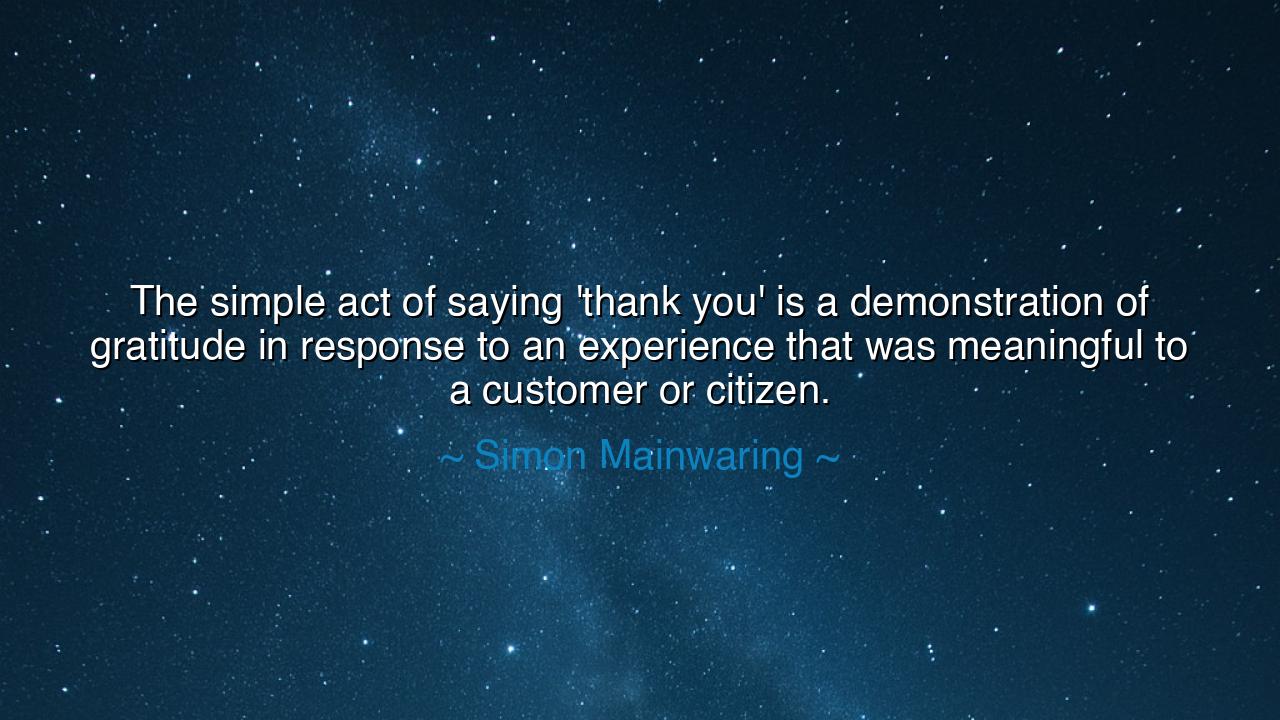
The simple act of saying 'thank you' is a demonstration of
The simple act of saying 'thank you' is a demonstration of gratitude in response to an experience that was meaningful to a customer or citizen.






The words of Simon Mainwaring shine with disarming simplicity: “The simple act of saying ‘thank you’ is a demonstration of gratitude in response to an experience that was meaningful to a customer or citizen.” Though brief, the statement holds the weight of ages, for it speaks of one of the most profound forces in human society: the acknowledgment of worth. To utter “thank you” is to recognize the value of another’s action, to affirm that their effort, their kindness, their service, was not overlooked. Such words are small in sound, but vast in power.
The ancients themselves knew this truth. In every culture, from the offering of incense at altars to the bow of respect before a king, there were rituals of gratitude. These rituals were more than formality; they were the cement that bound communities together. For when a person feels seen and appreciated, their heart is lightened, their spirit emboldened, and their resolve strengthened. Mainwaring reminds us that in the modern world, whether in commerce or citizenship, the same law remains: honor those who serve, and the bonds of trust deepen.
Consider the story of Abraham Lincoln during the American Civil War. Amidst the chaos of leadership and the weight of a divided nation, he took time to write personal letters of thanks to ordinary soldiers, to grieving widows, and to generals who bore heavy burdens. These notes of acknowledgment, simple yet heartfelt, became treasures to their recipients. Lincoln understood that a leader’s power is not only in commands and decrees but in gratitude—that a nation is strengthened when its people feel valued. His “thank you” was not an ornament of politeness, but a lifeline of meaning.
So it is in all walks of life. A customer served with care feels loyalty deepen when the giver pauses to acknowledge the relationship with a sincere word of thanks. A citizen, recognized for their participation or sacrifice, feels their role dignified, and thus they give more freely of themselves. In these exchanges, “thank you” is not a mere phrase, but an offering, a recognition of dignity, a spark that sustains the spirit of cooperation and trust.
What makes Mainwaring’s teaching powerful is its reminder that the greatest acts of leadership and service are often found not in grand strategies, but in small, intentional acknowledgments. A thank you costs nothing, yet it creates wealth of trust. It takes only breath, yet it breathes life into relationships. It is, as he names it, a “demonstration” of gratitude—a visible, audible sign that one has recognized value in another. Without such signs, gratitude remains hidden, and hidden gratitude benefits no one.
The lesson for us, then, is clear: do not hoard thankfulness in silence. Speak it. Write it. Show it. Give your “thank you” as a daily practice, not reserved for great deeds but offered for even the smallest kindness. Thank the server who brings your meal, the colleague who lends a hand, the family member who listens, the stranger who opens a door. Each act of gratitude becomes a thread, and together they weave the strong fabric of community.
Practically, make it your discipline to offer at least three sincere thank yous each day. Do not let them be hollow or mechanical; let them carry weight, eye contact, and honesty. When possible, name the action you are thankful for, so the recipient knows they have been seen. In leadership, whether in business or in family, make gratitude a cornerstone, for it will build trust deeper than authority alone ever could.
Thus, Mainwaring’s words shine as a torch of reminder: that thank you, spoken sincerely, is no small thing. It is the heartbeat of gratitude, the affirmation of meaning, the lifeblood of trust between people. Let us, then, be rich not in possessions only, but in spoken thanks. For when gratitude is voiced, the world is knit closer together, and no one walks unseen. Say it, and mean it: thank you.






AAdministratorAdministrator
Welcome, honored guests. Please leave a comment, we will respond soon